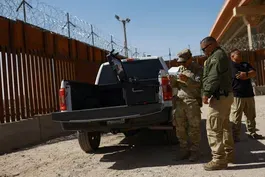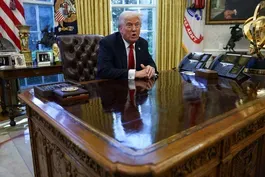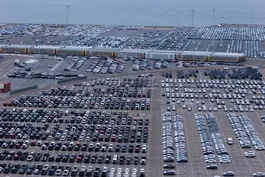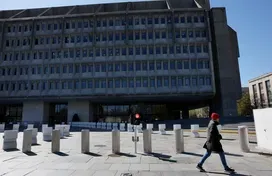
Angelo Carusone on tracking Project 2025, right-wing media
Clip: 3/27/2025 | 8m 24sVideo has Closed Captions
Angelo Carusone on tracking Project 2025 and right-wing media
Project 2025, the conservative policy project, became a flashpoint during the presidential campaign. Angelo Carusone of Media Matters studied the 900-page document and spoke with Geoff Bennett for our series, On Democracy, where we hear a range of perspectives on how government should function, what led to this moment in American history and where the country goes next.
Problems with Closed Captions? Closed Captioning Feedback
Problems with Closed Captions? Closed Captioning Feedback
Major corporate funding for the PBS News Hour is provided by BDO, BNSF, Consumer Cellular, American Cruise Lines, and Raymond James. Funding for the PBS NewsHour Weekend is provided by...

Angelo Carusone on tracking Project 2025, right-wing media
Clip: 3/27/2025 | 8m 24sVideo has Closed Captions
Project 2025, the conservative policy project, became a flashpoint during the presidential campaign. Angelo Carusone of Media Matters studied the 900-page document and spoke with Geoff Bennett for our series, On Democracy, where we hear a range of perspectives on how government should function, what led to this moment in American history and where the country goes next.
Problems with Closed Captions? Closed Captioning Feedback
How to Watch PBS News Hour
PBS News Hour is available to stream on pbs.org and the free PBS App, available on iPhone, Apple TV, Android TV, Android smartphones, Amazon Fire TV, Amazon Fire Tablet, Roku, Samsung Smart TV, and Vizio.
Providing Support for PBS.org
Learn Moreabout PBS online sponsorshipGEOFF BENNETT: Time now for our series On Democracy, where we hear a range of perspectives on how government should function, what led to this moment in American history, and where the country goes next.
Our primary focus tonight is Project 2025, the conservative policy project authored by former Trump administration officials, which became a flash point during the presidential campaign.
Angelo Carusone has studied that 900-page document.
He's president of Media Matters, a progressive nonprofit focused on researching and analyzing news media, including disinformation and online ecosystems.
I spoke with him days ago.
Angelo Carusone, welcome to the "News Hour."
ANGELO CARUSONE, President, Media Matters for America: Thanks for having me.
GEOFF BENNETT: You have emerged as an expert on Project 2025, this road map that then-candidate Trump during the campaign repeatedly disavowed.
Now the architect of Project 2025 was just quoted as saying the way that Trump has implemented it has exceeded his wildest dreams.
When you look at the way President Trump has expanded his executive authority, he's dismantled federal agencies, he's purged the federal work force, how much is Project 2025 guiding this work?
ANGELO CARUSONE: What Project 2025 provided was sort of the core story here, which was to -- who's the bad guy?
And that was the deep state.
And they basically said, essentially, most of the federal government, most of the federal workers were part of this deep state, a conspiracy to sort of prevent Donald Trump or anybody else from implementing major changes and then - - and sort of a conservative agenda.
And then the second thing it did was not only provide who the bad guy was, but then who's the good guy.
And, in this case, the good guy is not just Donald Trump.
It's a unitary executive.
So that is it.
Obviously, there's a lot of policy that Project 2025 has sort of provided the framework for, but essentially it was a story.
And it was a story of who's the bad guy and who's the good guy?
And, to that extent, that story is playing out exactly according to plan.
The only major difference is the timeline.
It's just moving along a lot faster.
We're basically in sort of like the fifth or sixth month of Project 2025, according to the book, even though we're only in the second month of the administration.
GEOFF BENNETT: So where does this head next then?
ANGELO CARUSONE: Well, one is that we're barely through -- even through the layoffs and the terminations.
We have only gotten rid of about 70-or-so-thousand federal workers.
Project 2025 calls for somewhere around 300,000 to about a million federal workers to be removed.
So where does it go?
More layoffs, more terminations.
The second thing, and this is the big one, is to sort of set up a collision between the executive branch and the judicial branch.
One of the big parts of Project 2025 was to make it very clear that the president and the executive has ultimate authority.
And that means that you start with Congress.
And Congress has largely abdicated itself to the administration.
So that was sort of their first target, but politics basically said, we're not even going to try to fight this out.
We're not even going to defend our sort of co-equal status.
So now where it goes next is sort of a showdown with the federal -- with the courts.
GEOFF BENNETT: If the strategy is all laid out and President Trump, you can argue about what he's done.
You can't argue that he hasn't been entirely transparent about it.
ANGELO CARUSONE: Yes.
GEOFF BENNETT: How should those opposed to what he's doing, how should they fight back?
ANGELO CARUSONE: I think the thing that's really important here is that we are not fighting a standard political battle.
Project 2025 is really unpopular.
Nobody actually really likes the policies there except a very small extreme few, but they don't see how those policies are actually affecting them.
There has to be a bigger story here.
And that starts with connecting the dots to the administration's actions and the harms that people are experiencing.
That's a political issue, but that is that's as much of a media issue as well.
And then, broadly, not this, consensus around not this.
And if we are not able to win the hearts and minds, Project 2025, whatever it becomes called, will be the new norm.
GEOFF BENNETT: And the right and Trump-friendly voices have an advantage here, because the other part of your work is looking at their saturation in the media ecosystem.
Tell me about that.
ANGELO CARUSONE: I think the biggest challenge right now that we're grappling with, and there are lots, but they all sort of play out in one arena, and that is an information landscape.
And the real battle from my perspective is in the information war.
And the right just has an enormous advantage there.
They have had some advantages along the way.
There's always been a little bit of an imbalance.
Talk radio and FOX News in the '90s and early 2000s, they had dominance.
They had a lot of listeners, but there were other things that counterbalanced them.
So they weren't dominant in the entire information landscape.
They just spoke to a very consolidated few.
That's just not the case anymore.
So we just did this really big study that looked on online voices and sort of the largest programs, sort of political and non-political, adjacent left, left adjacent, right, right adjacent.
When you add it all up, the right and right-leaning and right adjacent programming accounts for 82 percent of the major online shows.
That's podcasts.
That's streaming channels.
That's just -- that's narrative dominance.
That -- yes.
GEOFF BENNETT: And that includes podcasts that aren't overtly political like sports and comedy podcasts, for instance.
ANGELO CARUSONE: Yes, that was the part that was the most to me surprising and yet disturbing about the study, is that of the 400-plus shows that we looked at, 100 or so of them were non-political, sports, culture.
But when you actually looked at an analysis of the program, you listened to them, you coded them, we found that 72 percent of them, 72 percent of explicitly non-political programming contained not only political content, but right-leaning political content.
They just branded it or framed it as something different.
And that's where this really becomes key is, is that is the lens through which people see the world.
And so when all of that programming is sort of tilting the scales in favor of the right, the story that the majority of Americans are getting day-to-day is right leaning.
And I see no better illustration of that gap than if you look at in particular what's happening with young people.
Young people are accelerating and moving to the right faster than any other demographic.
And I don't think it's a coincidence that they just happen to consume online media more than any other demographic does.
That's their primary source and yet they themselves are moving at a faster and faster clip to the right because that landscape is so heavily dominated and saturated by the right.
GEOFF BENNETT: It's quite an asymmetry.
I mean, is there any way that Democrats could account for that in a way that is authentic?
ANGELO CARUSONE: I mean, that is the key issue here, right, is that they -- that they're playing with a very old playbook, that when they -- they think that the issue here is about messaging and message discipline, and say, well, if we all just go out there and say the same thing at the same time, that will get our message out.
That model worked 20 years ago.
That doesn't work now.
In fact, it feeds into the opposite.
They are feeding into the story that's being told about them, which is that they're puppets, that they're inauthentic, that they don't have anything original to say.
So what does that mean in practice?
Stop worrying about paid media.
Ads are not going to be the solution here.
Investing in storytellers -- the people online that do this work day-to-day, they're artists in a way.
They're storytellers.
They're creators.
They just need the resources to continue to do what they're doing.
That will help balance out the scales.
The second is to stop being so afraid.
The right has an advantage.
That asymmetry doesn't just give them the ability to project a story.
It also gives their leaders comfort and confidence.
If I know that I could go out there and face-plant, and I have a massive ecosystem that is going to be like sandpaper to smooth out all the edges, and not only make that face-plant look like the greatest acrobatic feat ever, but somehow turn it into a reward system for me, I have a lot more comfort.
I have a lot more confidence.
GEOFF BENNETT: And that speaks to the broader implications about what it means for our democracy.
ANGELO CARUSONE: That's right.
And so unless there's a real concerted effort around that asymmetry, the problem is not only going to not get better.
It's only going to get worse, because let's keep in mind that when we talk about all the tech oligarchs and the tech giants rolling back their policies, cozying up to Trump, it's not just that the leaders are doing that.
It actually affects the rules of their algorithms, what their systems are doing.
That imbalance is only going to speed up because the very systems that support them are actually privileging right-wing lies and right-wing misinformation.
GEOFF BENNETT: Angelo Carusone, president of Media Matters, thanks for being here.
ANGELO CARUSONE: Thanks for having me.
ACLU sues Trump for using wartime authority in deportations
Video has Closed Captions
ACLU attorney on suing Trump administration for using wartime authority for deportations (8m 10s)
Ex-FTC commissioner says firing threatens agency
Video has Closed Captions
FTC commissioner fired by Trump says move threatens agency designed to protect consumers (6m 36s)
How automakers are navigating Trump’s tariffs
Video has Closed Captions
How automakers are navigating Trump’s tariffs on imported vehicles and parts (6m 50s)
New development tests car-free living in sprawling cities
Video has Closed Captions
Development near Phoenix tests whether car-free living is sustainable in sprawling cities (7m 39s)
News Wrap: HHS cutting workforce by nearly 25 percent
Video has Closed Captions
News Wrap: Health and Human Services cutting workforce by nearly 25 percent (6m 39s)
Tariffs, cuts complicate life for some who voted for Trump
Video has Closed Captions
Trade wars, federal cuts complicate lives of some Nebraskans who put Trump back in office (6m 48s)
Providing Support for PBS.org
Learn Moreabout PBS online sponsorshipMajor corporate funding for the PBS News Hour is provided by BDO, BNSF, Consumer Cellular, American Cruise Lines, and Raymond James. Funding for the PBS NewsHour Weekend is provided by...

















